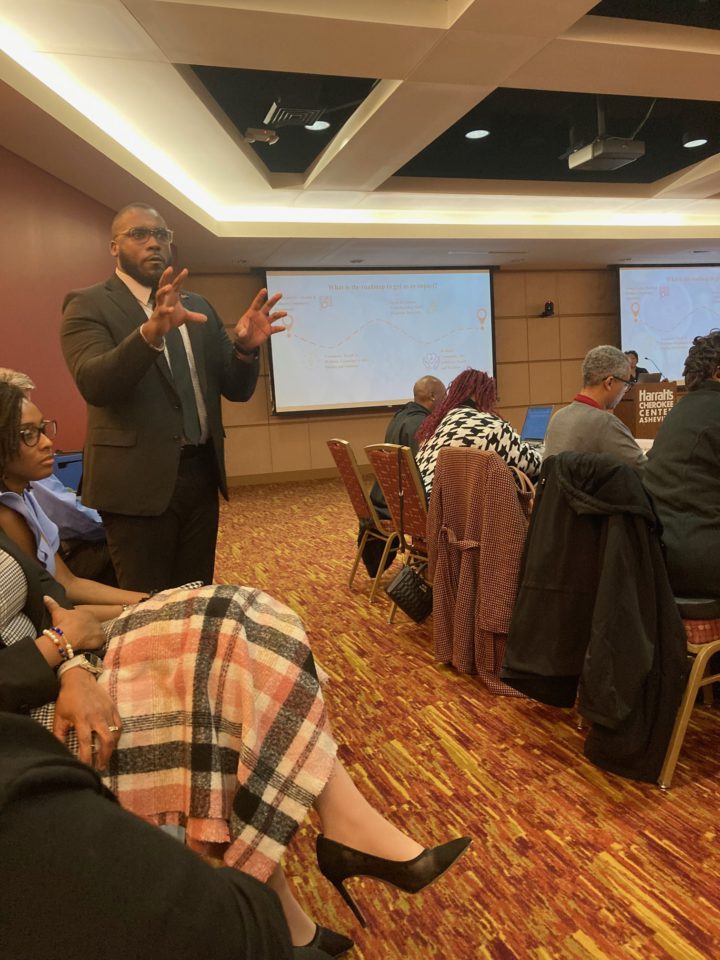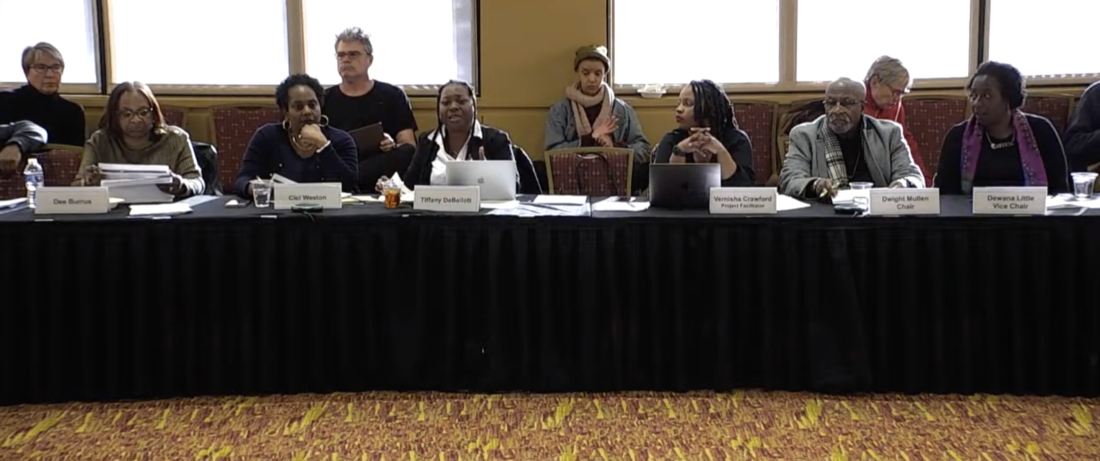At a Community Reparations Commission meeting March 18, the Carter Development Group, an independent consulting firm, identified four themes and outlined 10 “high priority” recommendations for actions the City of Asheville and Buncombe County should take to cease harm to their Black residents.
A lack of data specifying who uses government services topped the list of identified harms, while additional recommendations spanned the audit’s seven focus areas — criminal justice, economic development, education, health and wellness, housing, internal workforce, and equity, inclusion and human rights.
Adrian Carter, project lead and CDG founder, said the Cease Harm Comprehensive Audit shows that among other things, local governments should collect more data on who accesses its services to effectively track whether the administration of programs is equitable across the area’s residents.
While in many cases opportunities exist, there’s no way to determine if knowledge, representation and access are achieved by the Black community if more data is not continuously collected, Carter said.

Asheville became one of the first municipalities in the nation to pass a reparations resolution in July 2020 and, in partnership with Buncombe County, established a 25-member commission in March 2022. The commission contracted with Carter Development Group in December 2022 for about $174,000 to perform an audit of internal and external services for both the City of Asheville and Buncombe County.
The audit examined government services, policies, procedures, outcomes and compliance with local, state and federal regulations to create a baseline for local governments to make changes and shape the reparations commission’s recommendations, Carter said.
The second harm, according to Carter’s presentation, is that neither government sufficiently evaluated whether recipients of government-issued grants practiced racial equity. The third harm was the lack of racial equity training for city and county staff.
The fourth key harm pointed out a limited supply of affordable housing across the county, which is compounded by the absence of cohesive strategies among county and city officials and other key stakeholders, Carter noted.
Top 10 recommendations
Auditors took 30 measures across seven focus areas and came up with 108 recommendations. The top 10 were highlighted at the March 18 CRC meeting.
La’Shana Wiggs, project manager of the audit, said the commission should consider getting Buncombe’s legacy communities designated as historic districts so legal protections will prevent further gentrification in traditionally Black-majority neighborhoods such as Southside or Shiloh. The report cited state and local laws that would provide a pathway to achieving such designations.
To address the fact that Black students are subject to much higher disciplinary and law enforcement actions, Wiggs recommended the county tie school district funding to various initiatives so that the districts can be better held accountable. Wiggs suggested the county encourage the school districts to require cultural sensitivity training for district staff, integrate culturally relevant textbook selections and ensure core-subject staff members accurately reflect the student body’s demographics in exchange for funding.
Wiggs also suggested that local governments create a procurement industry and utilization dashboard to track the governments’ spending. They should include a search tool that would allow business owners to identify relevant opportunities for government contracts to increase competition and make the process more accessible for Black business owners. Along those same lines, Buncombe County should conduct a disparity study to determine how contracts are awarded to various demographic groups, she added.
Wiggs urged commissioners to consider establishing a Black Chamber of Commerce to focus on Black-owned enterprises at various stages of development.
Another recommendation was for Buncombe County to establish a Black Health Directory to increase the visibility and accessibility of Black therapists, doctors and nurse practitioners around the city and county.
That aligned directly with one of the recommendations outlined by the CRC’s own health and wellness focus group, which was presented by JéWana Grier-McEachin later in the meeting.
Commissioner DeWayne Barton asked for a bottom-line takeaway.
Carter, who often reiterates the importance of framing the reparations process in terms of solutions rather than problems during his presentations, illustrated his optimistic take.
“I see a lot of opportunities that with proper training, with proper leadership and with the right attitude … not only do you all make history and are groundbreaking in passing reparations, but in actually leading the country in how to actually implement and make these types of shifts and do it collectively with the city and county,” he said.
Facilitator Vernisha Crawford echoed Carter’s optimism, noting how the spirit of the room has changed since she came on board last fall.
“We’re doing some great work, y’all. We’re actually talking about things that change the system, which is really, really, really important. That’s how we sustain this work. … I’m proud, I’m flattered and I’m honored to help lead this conversation,” she said.
Community engagement
CRC Vice Chair Dewana Little presented an “ambitious” calendar of events for the community engagement committee.
“They have been very, very productive,” she added.
The committee is writing scripts to talk about reparations to those who may not be familiar and garner feedback for the commission’s developing recommendations.
Racing against a June deadline, the CRC discussed adding an extra meeting in April. A virtual meeting was already added in March to discuss focus area recommendations as a group.
Commissioner Osondu McPeters pointed out that instead of squeezing in extra meetings and rushing through community engagement, the commission should be given more time by city and county staff.
Sala Menaya-Merritt, equity and inclusion director for the City of Asheville, said she was looking at June as a sort of checkpoint, and if the commission needs more time, it will have to show the Asheville City Council what it will do with the extra time.






Sigh.